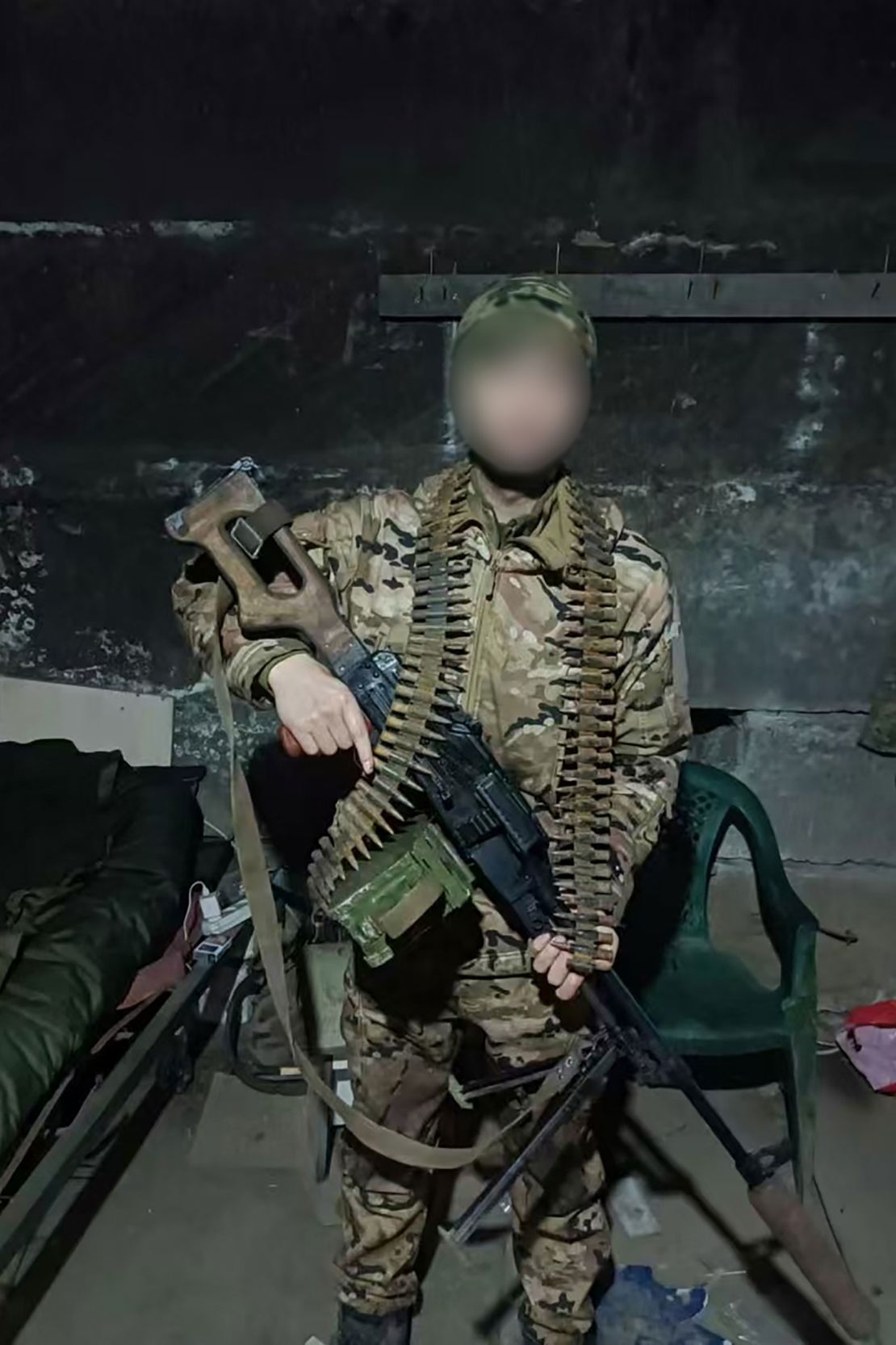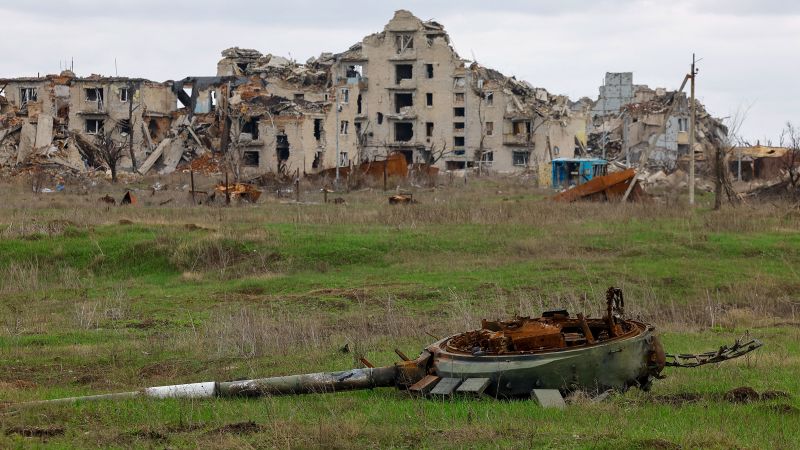Hong Kong
CNN
—
A Chinese man fighting for the Russian Army claims his superiors locked him in a dark steel-barred pit, with barely enough room to stand, for 21 days. His offense, he said, was a dispute with his commander over lifesaving protective gear.
Michael, not his real name, said he joined Russia’s fight against Ukraine to “have a taste for military life abroad” but after a brutal year on the frontlines is now convinced enlisting in Vladimir Putin’s army was “a mistake.”
His experience in the pit, where the 29-year-old said he could barely lift his head, killed his desire to fight for Moscow and he wants to send a message home to other Chinese nationals contemplating joining Russia’s fight.
“I have to speak out some truths and warn those irrational Chinese – don’t come over here,” he said.
Speaking to CNN by phone, Michael said he was currently recovering from injuries sustained on the battlefield.
“The world’s number two military is a sheer joke,” Michael said, listing subpar equipment, inadequate logistics, mistreatment and “severe corruption” as issues within the military, complaints that have been widely documented since the war began.
Both Ukraine and Russia have used foreign fighters to bolster their forces. But the issue of Chinese mercenaries fighting for Russia was thrust into the global spotlight when Ukraine’s President Volodymyr Zelensky revealed two Chinese fighters had been captured by Ukraine in early April and claimed there were “many more” in Russia’s ranks.
Zelensky demanded answers from Beijing which, in turn, denied any involvement and repeated previous calls for Chinese citizens to “refrain from participating in military actions of any party.”
Russia’s deputy foreign minister called the claims Chinese citizens were fighting in Ukraine a “complete untruth,” according to TASS, a Russian state media agency. Days later Ukraine paraded the Chinese fighters it captured in front of the media.
Kyiv said it had information that 155 other Chinese nationals were fighting for Russia. But the true number is likely higher, according to Zelensky. Both Michael and another Chinese fighter who fought with Russia told CNN they know of hundreds of others.
A handful of Chinese people have been fighting on the Ukrainian side too. CNN has confirmed their presence with one battalion, but Ukraine’s Land Forces could not provide a total number as each unit recruits directly.
Macho propaganda videos
Chinese men have been targeted on social media by recruitment ads to join Russia on the frontlines fighting Ukraine.
The posts and accompanying videos seen by CNN typically promise good pay and to boost the manhood of those who sign up.
The videos are all in Russian but come with Chinese translations. One carried Chinese subtitles saying: “Aren’t you a man? Be a real man!” It is not clear who made the translations.
Such videos caught the attention of Michael, who said he started seeing them in 2023 on Douyin – the Chinese version of TikTok. Once enlisted, he started posting regular social media videos of his time in Moscow’s ranks.
Michael told CNN he had been a soldier in China’s People’s Liberation Army, but left in 2018, and said seeing the ads and videos from other Chinese fighters on the frontlines rekindled his “aspiration for the army.”
“I felt pretty pumped back then,” Michael recalled. “As a former professional soldier in China, I thought there had to be a way for me to contribute here.”
He said it wasn’t political – he just wanted to fight. “I’m just a pure soldier,” he said.
While he could’ve chosen to fight for Ukraine, he said, but it was easier to get a visa to go to Russia and he arrived in Moscow on a tourist permit in November 2023.
After being initially turned down by the Russian army because he didn’t speak Russian, he said he joined the infamous mercenary group Wagner and was sent to fight in the Donbas region. Six months later, in May 2024, he says he signed a one-year contract with Russia’s Defense Ministry which sent him to Bakhmut. Other foreign fighters have signed similar contracts.
Michael told CNN that his contract offered 200,000 rubles ($2,400) per month and in a previous social media video said there were also bonuses when they captured territory from Ukraine – an extra 50,000 rubles ($598) for every kilometer they pushed eastward.
According to Michael, most of his Chinese comrades-in-arms are in it for the cash. As one self-proclaimed Chinese mercenary put it in a comment on Douyin: “no money, no honor.” CNN tracked the IP address of the post to a location in Russia.
Michael offered a reason the money mattered; describing himself and many Chinese fighters on Russia’s frontline as being “from the bottom of the heap” in his homeland’s hyper-competitive society and where economic growth is slowing.
Another Chinese national who said he fought for Russia and documented his exploits online told CNN what he earned as a mercenary was about three times what he was previously earning at home.
The man, 37, who CNN has chosen not to name, said he spent a year in Russia’s army from July 2023. He said it was hard for him to pinpoint exactly why he signed up, but didn’t think money was a major factor for him.

“Maybe it’s because I feel lost in life, like I’m searching for something,” he told CNN. “I just want to wander. As a man, I have had a kind of hero complex since my childhood.”
He said he previously served as a prison guard and, like Michael, claimed fighting for Russia was not a political choice.
He chose to fight for Russia because he felt it “has the upper hand in military strength.”
That view is not uncommon in China.
Maria Repnikova, an expert on Chinese and Russian politics at Georgia State University, said state media coverage in China leans towards a pro-Russia stance. “The Chinese outlets’ coverage of the war has significant impact on public perceptions of this ongoing invasion,” she said.
Some Chinese fighters have adopted language commonly deployed by the Kremlin, expressing their desire to “go against Nazi fascism” and referring to the war as a “special military operation” in public posts on Douyin, seen by CNN.
While they may not have caught the world’s attention until now, seeing Chinese fighters with buzz cuts sharing daily experiences from the frontlines and engaging in live chats with fellow fighters was commonplace on Chinese short video platforms. Their account handles often featured Chinese and Russian flags and CNN tracked several of their IP addresses to Russia and Russian-occupied territories in Ukraine.
But shortly after Zelensky raised the issue of Chinese fighters on the Russian frontlines with Beijing last week, many of those social media accounts were blocked.
The Russian recruitment ads, however, are still widely available on China’s tightly-controlled internet.
Michael was one of those Chinese fighters regularly sharing his experiences on Chinese social media, but he said was restricted from posting before the latest round of censorship. He believes the sweeping ban was because of his public comments detailing his mistreatment in the Russian military.
The other fighter, who returned to China in late 2024, said he discovered he was now prohibited from leaving the country last month, when he was stopped before a planned trip abroad. He suspects the travel ban is connected to his previous service in Russia.

There have been Chinese fighting on both sides of this war but those who chose to fight for Ukraine – who largely see themselves as motivated by ideology rather than finances – seem to have one thing in common: they spent time out of China.
Jason, who was born in China, moved to the United States during his high school years.
He said he dropped out of his master’s program in Computer Science at a US College in May 2023 to go to Lviv, a city in western Ukraine, and enlist in the Ukrainian International Legion. CNN has seen his Chinese passport and enlistment contract.
After spending four months dodging shells in trenches and foxholes, the then infantryman said he sought to be even more active in combat. He applied to transfer to an assault company, but said he was turned down because the Ukrainian commander was suspicious about his nationality.
Reflecting, a year after returning to the US, he said that was a “pity,” but he understood the suspicion because “China and Russia are pretty close.”
China’s threat to one day take Taiwan was a motivation for Jason to fight with Ukraine.
The cause of the self-governing island – which China’s Communist Party claims as its own and has vowed to seize by force, if necessary – is deeply personal for the 27-year-old. He said his great-grandfather was a Nationalist soldier who lost his life in the fight against the Communists in the late 1940s during China’s civil war. The defeated Nationalist government retreated to Taiwan.
He hopes the fact he went to fight for Ukraine would give people in Taiwan a “sense of hope that someone would come to help,” if China were to invade.
“I think most of the Chinese people are being brainwashed for a long time,” he said.
Sophie, a PhD student from a top-tier Chinese university, is currently waiting for approval to join the Ukrainian International Legion. CNN has seen her passport and application documents.
She told CNN she “used to be pretty indifferent to politics” but her thinking changed during a year of studying in Europe, away from the confines of China’s Great Firewall and its pervasive online surveillance.
She said she was inspired to sign up for service in Ukraine after seeing a video about the only known Chinese national killed while fighting for Ukraine.
Sophie told CNN many of her friends back home in China hold pro-Russian views of the war and said she too was once “brainwashed” by “one-sided information from Russia.”
Claims of a “one-sided” narrative in China were also made by the two Chinese fighters captured by Ukraine. Ukrainian security personnel watched over the men as they spoke, likely under duress, and the fact the two men were put in front of media at all is likely a violation of international humanitarian law.
Following the capture, Zelensky has publicly said Ukraine is investigating whether the Chinese state has had a hand in encouraging its nationals to fight for Russia.
“I don’t have an answer to this question yet. The Security Service of Ukraine will work on it,” he said last week, adding: “We are not saying that someone gave any command, we do not have such information.”
China has repeatedly denied any state involvement. “These claims are groundless,” said Lin Jian, spokesperson for China’s Foreign ministry, after being asked about Zelensky’s statement “many more” Chinese citizens were fighting for Russia.
“Ukraine should acknowledge China’s efforts and constructive role in seeking a political solution to the crisis,” said Lin in a news conference on April 9.
China’s quick move to censor the social media accounts of Chinese fighters in Russia is to have been expected, according to Maria Repnikova, the Georgia State University expert. “I am not surprised by the censorship of mercenaries since the capture was a big scandal,” she said.
While social media has undoubtedly played a role in the recruitment of Chinese fighters, Repnikova said the fact the recruitment ads were not censored in China, and remain available, was likely more an “oversight” than “strategic” because the pro-Russian view in such videos is “just entwined with the narrative of Russia fighting well.”
Michael and Jason may have fought on opposite sides of this war, but they have a shared experience: the reality of war, they said, was much worse than they ever expected.
“It’s incredibly brutal, far beyond what anyone can imagine,” said Michael.

